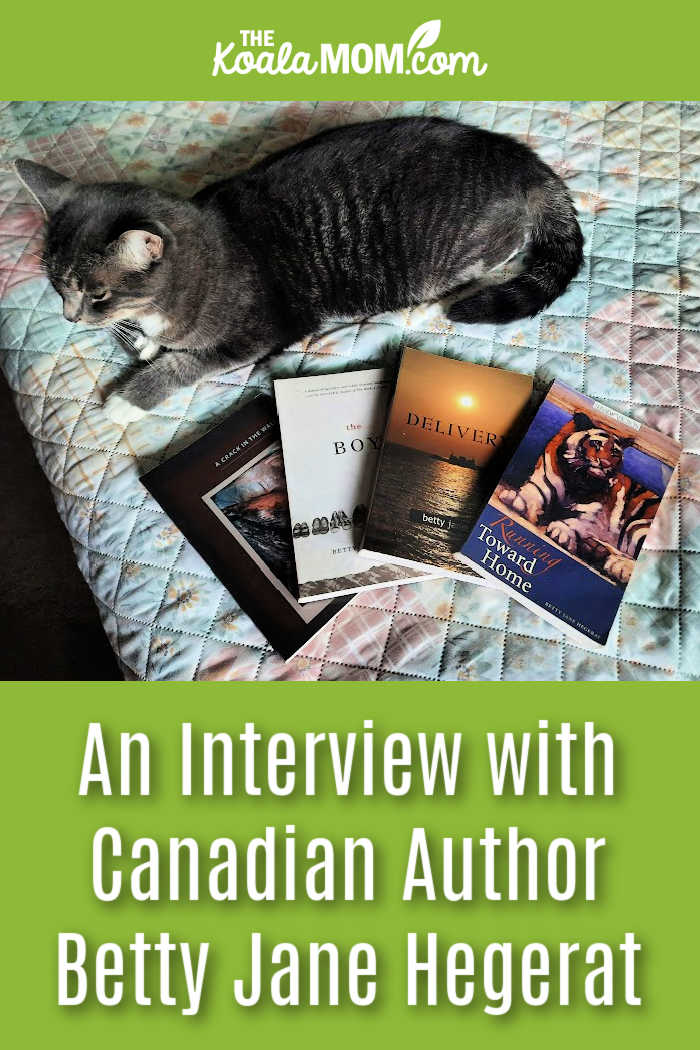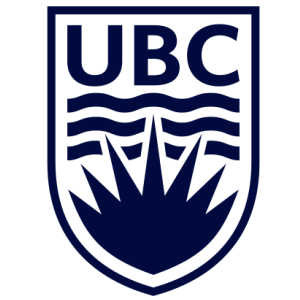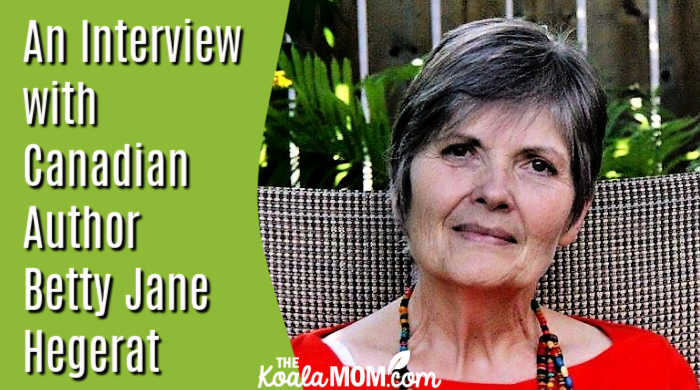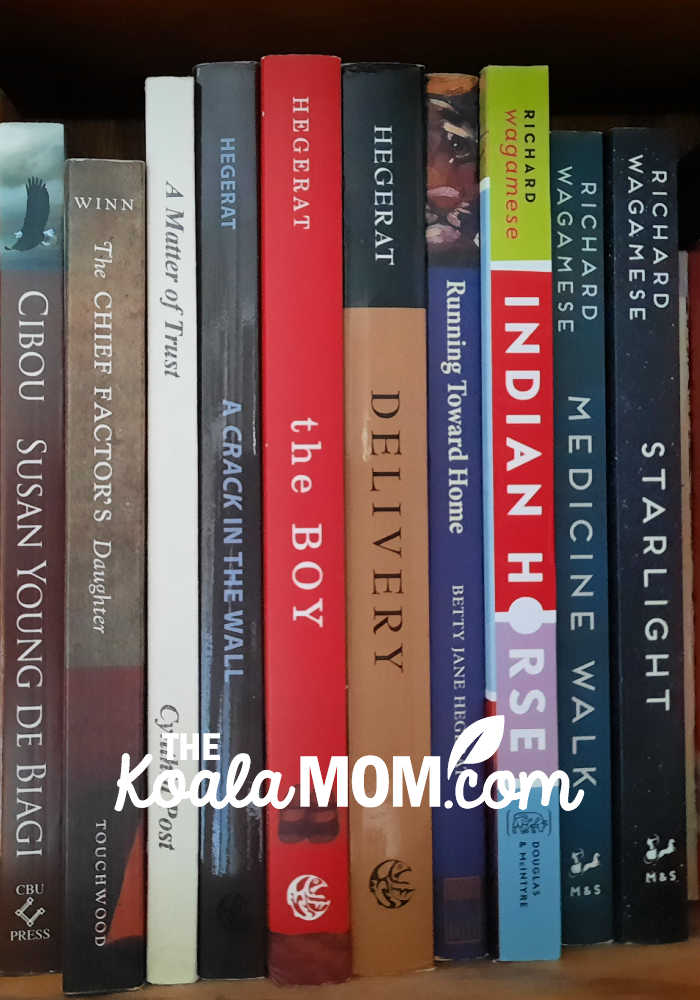Betty Jane Hegerat is a Canadian literary author whose books dive deep into short but difficult season’s in each character’s life. While most novels happen over a span of weeks or months, telling highlights and skipping details, Betty Jane’s novels happen over hours or days, investigating the richness of each moment. I first met her at a writer’s conference in Alberta and have since collected and read most of her books. Here, I’m excited to chat with Betty Jane about completing her master’s degree and writing her strangest book.

This post contains affiliate links; as an Amazon associate, I earn from qualifying purchases.
The University of British Columbia offers several MFA programs in creative writing, including a part-time distance education option (which I considered for a few years). Betty Jane completed this degree over several years. As both a reader and a writer, I’ve always been interested in the ways that writers develop their careers, and was curious how Betty Jane felt her degree influenced or helped her writing.
TKM: How did you find out about the MFA program at UBC?
Betty Jane: I had been contemplating applying to MFA programs for several years but the ones that appealed to me would have required a move and full-time student status, neither of which was practical or possible. Distance learning seemed the way to go. I looked at the possibilities, found several programs in the U.S. that seemed a good match, and was on the verge of deciding when I heard that UBC was establishing a low-residency option in their MFA Creative Writing program.
I applied in the first year, wasn’t accepted, but with the tenacity that is required in every step of a career in writing, applied again the second year and was delighted to be accepted.
TKM: What attracted you to this program?
 Betty Jane: The program at UBC has an excellent reputation of long standing. The faculty for the distance program included a number of writers with whom I was eager to study and the requirement to work in at least three genres appealed as well. I had been primarily a fiction writer but had a difficult non-fiction project in mind and knew that I would need help in crossing into that new territory.
Betty Jane: The program at UBC has an excellent reputation of long standing. The faculty for the distance program included a number of writers with whom I was eager to study and the requirement to work in at least three genres appealed as well. I had been primarily a fiction writer but had a difficult non-fiction project in mind and knew that I would need help in crossing into that new territory.
TKM: How do you feel that the program impacted your writing?
Betty Jane: The three genre requirement led me to take a poetry course, writing for children, and creative nonfiction in addition to the novel course. I really did broaden my scope. The courses — apart from one independent study in nonfiction and the thesis — were are all writing workshops. Most of my fellow students had excellent critical skills and there was enormous value in their comments.
I ended up doing a novel as my thesis. I had a rough draft in hand before I began the program. My thesis advisor pushed me to go far deeper into that work than I had ever imagined and I find myself using the new and sharper tools I acquired in every new piece of fiction that I’ve begun since I finished the degree.
I also came out of two other courses with major projects well on the way to becoming book length manuscripts and a far greater confidence in my ability to work toward my vision for both those books.
TKM: What did you like the best and what did you like the least about the program?
Betty Jane Hegerat: I loved the interaction with other students from a wide span of age, experience, and geographical location. The summer residencies gave an opportunity to meet them and to talk with instructors. Ten days mid-summer on the UBC campus felt like a gift.
I was determined to push through the program in two years and did manage it, but the nature of online courses made the workload almost overwhelming at times. If there’s anything I dislike about this fine program, I suppose it’s the lack of real contact in the courses. Online communication is more fraught with risks that comments will be misinterpreted than if they were made in a regular classroom with the advantages of physical presence.
TKM: What advice would you give to potential applicants to the program?
Betty Jane: There is stiff competition for the program and in the two summers residencies I was in awe of the range of student experience. The year I entered the program the age range spanned about 35 years; there were those who had books to their publishing credit and new writers with few publications. What was shared and common to all, though, was a fierce passion for writing.
So my very simple advice would be to let that passion (and the talent that I believe fuels an obsession with writing) shine in the portfolio. Send work that shows skill, curiosity, and creativity that is not bound by any tight constricts.
To those who are lucky enough to be accepted in the program, I would say take advantage of the amazing range of experience offered. Challenge yourself by taking the courses that push you out of your comfort zone. Many people enter the program convinced that they are best suited to a particular genre and emerge with a new passion.
 TKM: Your fourth book, The Boy (Oolichan Books), is “strange hybrid of memoir, fiction, true crime and metafiction that claims to belong to the genre of creative non-fiction.” This book is about a small slice of Alberta history that some readers may remember (though I didn’t). You mentioned that the story idea came from a news report that stuck in your head until you learned more. I’ve also had the experience of reading something that left me unsettled until I learned more about it. Did your research process help you put this to rest? Did it raise more questions?
TKM: Your fourth book, The Boy (Oolichan Books), is “strange hybrid of memoir, fiction, true crime and metafiction that claims to belong to the genre of creative non-fiction.” This book is about a small slice of Alberta history that some readers may remember (though I didn’t). You mentioned that the story idea came from a news report that stuck in your head until you learned more. I’ve also had the experience of reading something that left me unsettled until I learned more about it. Did your research process help you put this to rest? Did it raise more questions?
Betty Jane: I have a number of stories that were triggered by new reports, that “what if?” spin we put on a snippet we hear about someone else’s life. Because I write fiction, I usually head in a direction as far away from the real story as possible. The Cook story and how it hijacked the fiction I thought I was working on was far from my usual operating style.
The Cook family members have been dead for 50 years now. Normally, that would have given me the sense that I could just steal the horrible underpinnings of their fate and go wherever I wanted with the story. But something about this case blocked all my attempts to treat it as simple fodder for fiction. Perhaps it was that need to find out what happened in order to deal with the fear that so unsettled me when I went back to read the real story.
I was eleven years old when this story was planted in my brain. The memory of it, all these decades later, took me by surprise. Yes, the research and the writing did help me put it rest. And as for raising more questions, I think it’s more a case of leaving the big questions unanswered, but making peace with the fact that they no longer matter. To me, at least. On the other hand, it’s possible someone else with more of an investigative bent will go farther than I have.
TKM: How did you go about researching the murders?
Betty Jane: Oh yes, the very sort of research for which I have little patience. When I first began surfing the internet for information about the Cook case, there was barely anything there. Now, there seems to be a resurgence of interest in the case. The End of the Rope, a play written by Calgary playwright Aaron Coates in 2002, has been produced in a number of Alberta theatres, mostly recently in Bashaw and the company who performed it there will be taking it to The Fringe in Edmonton. I’ve also heard a rumour that there is a possibility of a television docudrama.
Because my interest was focused on the family and the dynamic that led up to the horrific events of the night of June 25, 1959, I wanted to find people who had known the Cooks. I needed to sift through the newspaper articles, and the police evidence and the court documents—much of which was conveniently archived at the Stettler museum—but the most valuable part of my research came from interviews, both formal and in the many conversations I had that aren’t officially recorded in The Boy.
TKM: What was the hardest part about researching? The easiest?
Betty Jane Hegerat: The easiest was the reading of not only the printed archives, but of the three books I found that specifically chronicled the case. I owe a huge debt of gratitude to Jack Pecover who wrote The Work of Justice, The Trials of Robert Raymond Cook. This is a work that examined the Cook case from every possible angle, and became my major source in sorting through the details of the crime and the court case.

TKM: You used both fiction and nonfiction to tell this story. Can you explain why?
Betty Jane: The simplest answer is that I couldn’t separate the two, nor could I let go of either story. At some point they’d become so tangled that I was ready to give up on both. I’d been told by a number of people that I would have difficulty finding a publisher for such a muddled work. That no one would know how to market The Boy, where to shelve it in the bookstores and libraries. Those sorts of concerns are far from my mind when I write, and I don’t like to be reminded of them, so I think perhaps there may have been some sheer orneriness in my forging on with this structure. There was no other way for me to finish the book.
TKM: Is there anything else you’d like to share with readers?
Betty Jane: Only my gratitude that there is always an audience for books. The world of books and publishing is changing so quickly and dramatically that we can hardly keep up with it. I find it exciting and energizing. So many ways to access and read good books, and so many good books being written. The way we read is evolving, but the important thing is that we continue to read.
So the last thing I want to say is that I think one of the greatest gifts we can give our children is a love of books and reading. Whether they hold a beautifully illustrated paper book in their hands, or enjoy a good story on a jazzy-looking e-reader in a primary colour, we need to nourish the appetite. That’s my manifesto.

Bonnie, thank you for inviting me to your blog. I’m honored to spend time with one of my favorite reviewers and her following of readers.
More about Betty Jane Hegerat
Betty Jane Hegerat is the author of two novels, Running Toward Home and Delivery, and a collection of short stories, A Crack in the Wall. A social worker by profession, Betty has taught creative writing in various venues. She writes from a longstanding fascination with relationships and families and the secrets and lies that bind ordinary lives together. Her books have been shortlisted or finalists for several prizes. Betty Jane is the recipient of the Writers Guild of Alberta 2015 Golden Pen Award for Lifelong Achievement in Writing. To find out more about Betty Jane and her books, drop by her website.

One Response
Hi Bonnie,
Great interview, and I’m glad this book has led us to each other’s blogs.
(And Betty Jane, I’m looking forward to hearing more!)
all the best,
Shelley